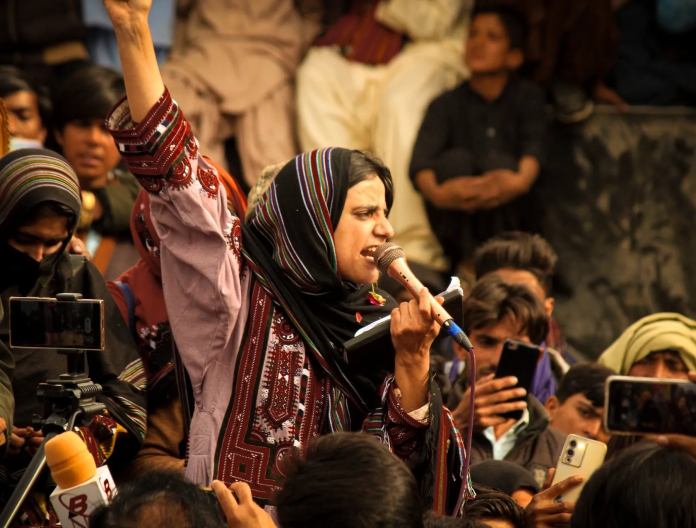In yet another chilling reminder of the deep-rooted societal rot festering in parts of our country, a young couple in Balochistan was brutally gunned down on July 19, 2025 for committing what some still perversely consider a “crime”: marrying for love. This heartrending tragedy is not just a story of two lives lost—it is an indictment of the collective moral decay, the prevailing culture of violence, and the absolute collapse of law in certain tribal and feudal belts of Pakistan.
The incident, which reportedly took place in the outskirts of Barkhan, saw a man and woman shot dead by family members enraged by their union. Their only fault? Daring to choose each other in a land where love must first pass through the oppressive filters of tribal honour and patriarchal control. The murder of this couple—innocent, consenting adults—is not an isolated episode. It is a pattern repeated in many parts of Balochistan and Sindh, where “honour killings” are still carried out with impunity, often without consequence.
Chief Minister Sarfaraz Bugti swiftly issued a statement, claiming that the culprits had been arrested. But few hold out hope that justice will follow. We’ve seen this playbook before: hollow condemnations, a flurry of media coverage, token arrests, and eventually, silence. The truth is, these acts are not just committed by fringe elements; they are often protected, facilitated, or silently condoned by the very power structures that claim to oppose them. Many of these tribal chieftains and sardars who sit in assemblies and boast of progressiveness harbour the same regressive mindset that fuels these murders.
This is not merely a law-and-order failure—it is a societal illness. The problem lies in the mindset that views women as property, love as rebellion, and honour as something that can be stained by personal choice. How can we expect to move forward as a nation when basic human rights, like choosing one’s life partner, are punishable by death in some parts of the country?
This brings us to the broader, long-standing issue of Balochistan’s marginalization. Despite being Pakistan’s largest province by area and richest in natural resources—home to vast reserves of natural gas, coal, copper, gold, and more—Balochistan remains the most backward province in terms of development, education, health, infrastructure, and rule of law. The poverty is staggering, the literacy rate dismal, and basic services like clean water, electricity, and healthcare remain inaccessible to large swathes of the population.
The question must be asked: why does Balochistan continue to languish in such a state? Is it mere neglect, or is it deliberate?
Many observers believe that the province is kept underdeveloped by design—trapped in a web of tribal politics, local feudalism, and a governance model that benefits a select few while depriving the masses. The tribal chieftains and sardars, who wield enormous influence, often act as both the law and its executioners. These powerbrokers have resisted modern education, development projects, and social reform—because a disempowered, uneducated populace is easier to control. In such an environment, practices like honour killings thrive. It is not just about killing individuals—it is about killing autonomy, modernity, and dissent.
It often feels like Pakistan’s laws stop at the provincial border of Balochistan. Constitutional protections, human rights, and civil liberties that are, at least on paper, available to all Pakistanis seem to vanish in these tribal strongholds. Local jirgas and tribal customs frequently override state laws. Women are routinely denied their rights. Victims are silenced. And perpetrators are shielded by their social standing or tribal affiliations.
It is especially tragic and ironic that such killings are carried out in the name of religion, when Islam, in its true spirit, upholds the right of adult women to choose their spouse. The Quran and Hadith are explicit on the subject: consent is essential for a valid marriage. Yet tribal codes are routinely allowed to override religious teachings and constitutional rights. This fusion of cultural rigidity with religious misinterpretation continues to embolden murderers in the name of so-called honour.
We must say it plainly: there is no honour in honour killings. They are cold-blooded murders, often committed with calculated cruelty. They are an affront to human dignity, a stain on our national conscience, and a violation of both moral and legal codes.
It is high time the government, civil society, religious scholars, and local communities united to uproot this barbaric practice. Laws must not just exist on paper—they must be enforced with zero tolerance. Police officials who turn a blind eye to such killings, or worse, facilitate cover-ups, must face exemplary punishment. Community elders who endorse these crimes should be named, shamed, and prosecuted. And above all, an urgent cultural shift must be engineered through education, media, and religious discourse.
We must also begin a national dialogue to dismantle the toxic code of “ghairat” (honour), which has claimed far too many lives. Let us not let this couple’s death fade into obscurity. Let it serve as a painful reminder of the urgent reform that is needed—legal, cultural, and moral.
The youth of Balochistan deserve the same rights, freedoms, and protections as anyone else in Pakistan. They deserve schools instead of slogans, justice instead of jirgas, and safety instead of subjugation. The state must assert its presence—not through military might, but through justice, equity, and development.
If we cannot protect our people’s right to love and live freely, then we have failed as a society. Let this curse of honour killings end in our generation—before more hearts are stopped simply for daring to beat freely.

















